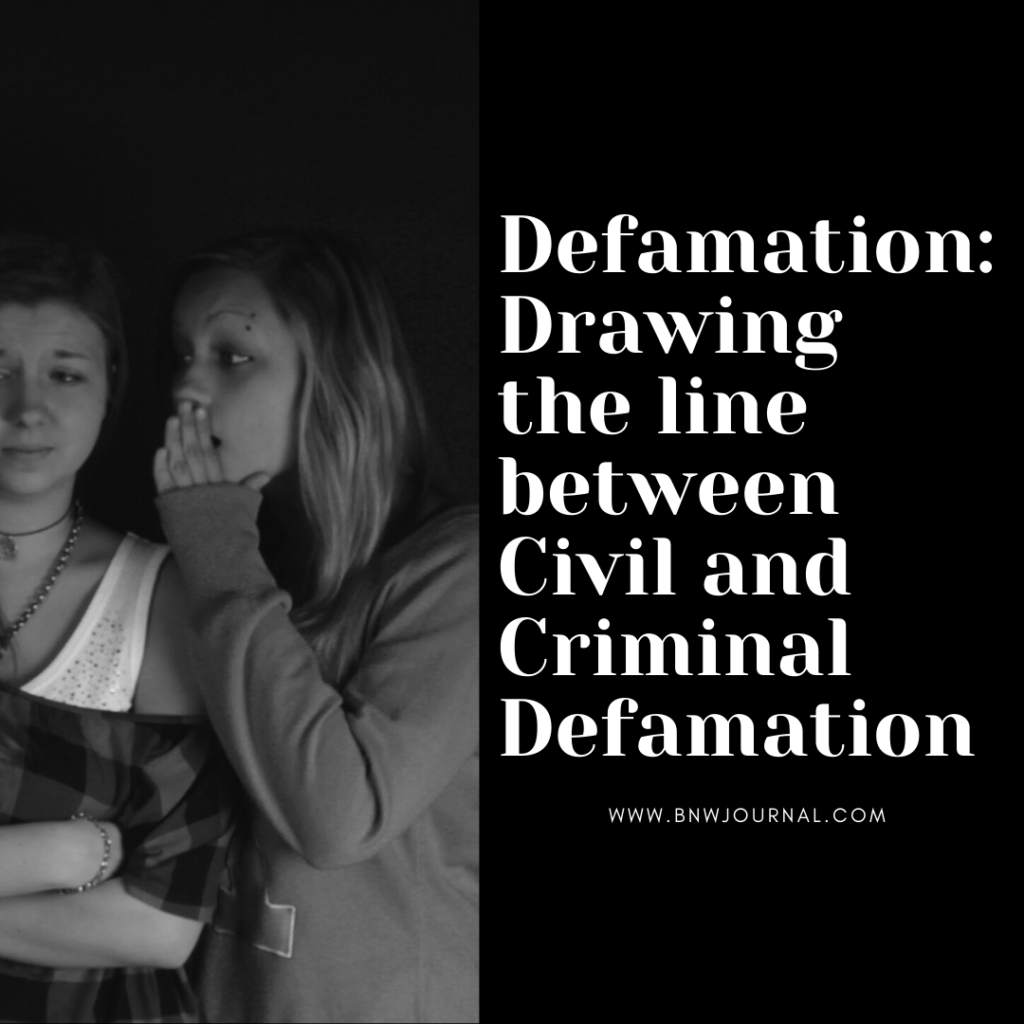![]()
Introduction
An act which harms somebody’s reputation is termed as defamation. It is the act of saying false statements in order to make reasonable people have a negative opinion about a person or an entity. Libel and slander are two ways of causing defamation. Slander is when the defamatory statements are in the form of spoken words or gestures. If the statements are written or published, then it is termed as libel. Defamation has been made both a civil and a criminal offence in India.

Defamation under civil law is treat as a Tort. For which the remedy is available as monetary damages. Under criminal law, defamation is a bailable offence. For which arrest cannot be done without a warrant. The charges of defamation can be drop if both the parties compromise out of the court. The burden of proof is on the victim who claims that the statement is refer to him.
Essentials to cause Defamation
There are certain essentials to prove that defamation has been caused. First, the statement made must be defamatory so as to cause injury. It means that it should result in lowering of a person’s reputation in the eyes of a reasonable and ordinary man. Secondly, the statement must be directly aim at the person claiming defamation i.e. A third person should infer that the statement was made for a particular person. Lastly, the statement should come to the knowledge of a person other than the person defamed. If a person is directly defame through a letter of which nobody else is aware of. It will not be consider as defamation.
Criminal Defamation
Criminal defamation has been provided under Section 499 and 500 of the Indian Penal Code, 1860. Definition of defamation as given under section 499. It says that whoever by words or signs or representations, makes or publishes any insults concerning any person. With the intention or knowledge that it will harm them. It is to defame that person. Section 500 gives the punishment for defamation which is fine or imprisonment for up to two years or both.
Under criminal law, defamation is a non-cognizable offence, which means arrest cannot be made without a warrant from a magistrate. Once an arrest has been made the accused has the right to seek bail as defamation is a bailable offence. Also charges can be drop if the accused and the victim agree for compromise. Once the investigation starts, the burden of proof is on the plaintiff. To prove that the defamatory statement refers to him and is derogatory. To establish a successful defamation suit, the plaintiff has to prove the presence of all the essentials to cause defamation.
An important aspect to be prove is the intention in criminal law. If there is no intention, the knowledge that the publication was enough to affect someone’s reputation becomes essential. It is further subject to proof beyond a reasonable doubt. Section 499 also provides with ten exceptions. Like imputation of truth, good faith, opinion on merits of case decided in court, etc. Under all such circumstances, the statement will not be consider defamatory.
Civil Defamation
In India, the civil law for defamation is not yet codify. It depends upon the judge-made law or the law develop through various decisions. If a person chooses to avail remedy under civil law. He can move to the High Court or the lower court. He can file a suit to get damages in the form of monetary compensation. The claimant needs to prove that his reputation has been hamper. The existence of all the essential to cause defamation. The accused then can claim the general defences available i.e. The truth of the imputation, fair comment, and privilege among others.
Under a Civil suit, intention to defame is not important and once it is prove to the extent that a defamatory statement was communicate and an ordinary reasonable man would infer it to be direct at the plaintiff, the suit subsists. Monetary compensation is available depending upon the amount of injury sustained by the plaintiff.
Difference between Civil and Criminal Defamation
The most basic difference between civil and criminal defamation is that under criminal law, defamation is codified while there is no provision in civil law for defamation and it is based on the general principles which have evolved through court decisions. Also, the punishment given is different from civil and criminal law. Civil law provides remedy under the law of torts, an aggrieved person approaches the court and monetary damages can be granted, while under criminal law, there is provision for both imprisonment and fine. For the institution of a case, court fees are to be submit as per the value of damages under civil law, while no provision of court fees is there under criminal law.
The standard of proof as seen under criminal law is stricter than compare to civil law. Crimes are to be prove beyond a reasonable doubt under criminal law, whereas under civil law lower standards of proof are sufficient and likeliness of a situation is easily prove by the predominance of evidence. In criminal law, it is consider that damage is to the public rather than to an individual as in the case of civil law.
Conclusion
Law of defamation allows anybody who feels that they have been wrongly accuse and their image has been hurt to approach the court and file a criminal/civil suit for defamation. Cases of defamation are generally institute by people who have a public image or are renow and hence their public image can be injure easily. It has always been debate whether defamation should be treat as a civil or criminal wrong or continue to be treat as both. But it would be better if there is a single remedy available, either civil or criminal law.
Criminalizing defamation has also led to the issue of infringement of the right to freedom of speech as guaranteed by Article 19 of the Constitution, but the Supreme Court made it clear that criminalizing defamation is constitutionally valid as reasonable restrictions can be imposed on fundamental rights.



0 Comments